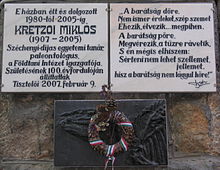Miklós Kretzoi
 From Wikipedia the free encyclopedia
From Wikipedia the free encyclopedia
This article has multiple issues. Please help improve it or discuss these issues on the talk page. (Learn how and when to remove these messages)
|
Miklós Kretzoi | |
|---|---|
| Born | 9 February 1907 |
| Died | 15 March 2005 (aged 98) |
| Citizenship | Hungary |
| Alma mater | Pázmány Péter University, University of Pécs |
| Known for | Paleoanthropology |
| Awards | Széchenyi Prize |
| Scientific career | |
| Fields | Geology, paleontology |

Miklós Kretzoi (9 February 1907 – 15 March 2005) was a Hungarian geologist, paleontologist and paleoanthropologist[1][2] and Széchenyi Prize winner.[3]
Kretzoi studied Arts and natural sciences at the then Pázmány Péter University, Budapest from 1925 to 1929.[1] While still a student, he worked as a volunteer at the Geological Institute of Hungary.[1]
In 1930 he graduated from the University of Pécs with a PhD in Palaeontology, Geology and Geography.[3] In 1933 he commenced work with the "Hungarian-American Oil Inc" as a geologist and geophysicist. He remained at Hungarian-American Oil until the outbreak of the Second World War.[1] Kretzoi moved to the National Museum of Hungary where he was curator of the Mineralogy and Paleontology departments until he began work at the Geological Institute of Hungary in 1950.[1] Kretzoi was the director of the Geological Institute of Hungary from 1956 to 1958.[4] From the mid-1960s he led the "digs" at Rudabánya where a number of Anthropoid fossil remains were discovered.[1][2]
The genus Kretzoiarctos was named after Miklós Kretzoi.[5] Its type species Kretzoiarctos beatrix was previously classified as a member of Agriarctos, and Agriarctos was described by Kretzoi.[6]
References
[edit]- ^ a b c d e f Begun, David (2005). "Miklo's Kretzoi, 1907–2005" (PDF). University of Toronto. Archived from the original (PDF) on 6 July 2011. Retrieved 15 March 2010.
- ^ a b "Elhunyt Kretzoi Miklós geológus" (in Hungarian). 17 March 2005. Retrieved 15 March 2010.
- ^ a b "Rudabánya and the Early Phase of Hominisation". Retrieved 16 March 2010. Exhibition in the Hungarian National Museum, 9 February - 24 May 2004
- ^ "The short history of the Institute". Archived from the original on 14 March 2010. Retrieved 17 March 2010.
- ^ Abella, Juan; Alba, David M.; Robles, Josep M.; Valenciano, Alberto; Rotgers, Cheyenne; Carmona, Raül; Morales, Jorge; Montoya, Plinio (2012). "Kretzoiarctos Gen. Nov., the Oldest Member of the Giant Panda Clade". PLOS ONE. 7 (11): 1–5. Bibcode:2012PLoSO...748985A. doi:10.1371/journal.pone.0048985. PMC 3498366. PMID 23155439.
- ^ Abella, J.; Montoya, P.; Morales, J. (2011). "A New Species of Agriarctos (Ailuropodinae, Ursidae, Carnivora) in the Locality of Nombrevilla 2 (Zaragoza, Spain)". Estudios Geológicos. 67 (2): 187–191. doi:10.3989/egeol.40714.182.